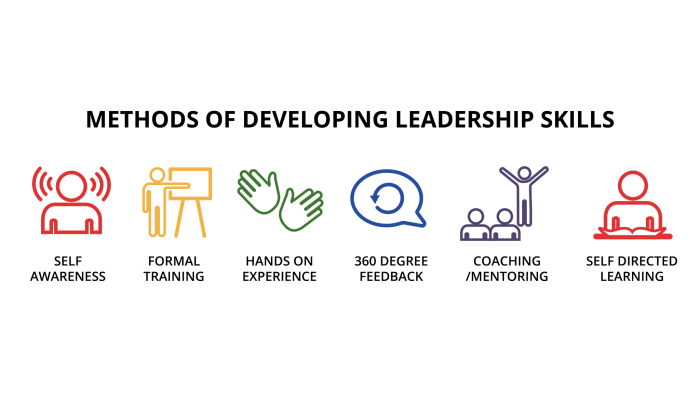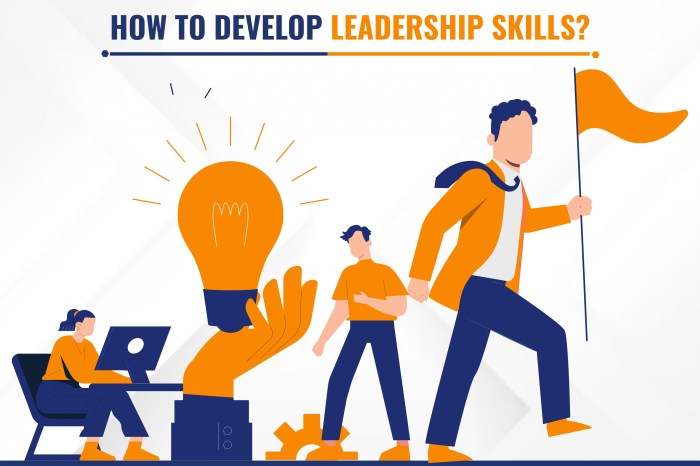Developing Leadership Skills is the key to unlocking your full potential and achieving success in both personal and professional realms. From effective communication to fostering positive relationships, this journey is filled with opportunities for growth and empowerment.
Importance of Developing Leadership Skills

Developing leadership skills is crucial for personal and professional growth as it enables individuals to effectively guide and motivate others towards a common goal. These skills are essential in various aspects of life, including education, career, and even personal relationships.
Positive Impact on Teams and Organizations
Effective leadership skills can positively impact teams and organizations by fostering a collaborative and productive work environment. A strong leader can inspire team members, boost morale, and streamline operations to achieve better results. For example, a leader who communicates effectively, delegates tasks efficiently, and provides constructive feedback can help a team work cohesively towards success.
Correlation with Career Advancement Opportunities
Strong leadership skills are often linked to career advancement opportunities as they demonstrate an individual’s ability to take on more responsibilities and lead others effectively. Employers value candidates who possess leadership qualities such as decision-making, problem-solving, and strategic thinking. By developing these skills, individuals can increase their chances of progressing in their careers and taking on leadership roles within organizations.
Key Components of Leadership Development: Developing Leadership Skills

Leadership development involves honing various qualities and skills that are essential for effective leadership. These key components play a crucial role in shaping great leaders and driving success in any organization.
Essential Qualities of a Great Leader
- Communication: Great leaders excel in clear and effective communication, ensuring that their vision and goals are understood by all team members.
- Decision-making: Strong leaders are able to make timely and informed decisions, considering all factors and potential outcomes.
- Empathy: Empathy allows leaders to understand and connect with their team members on a personal level, fostering trust and collaboration.
Different Leadership Styles and Their Impact
- Autocratic: In this style, the leader makes decisions without input from team members, leading to quick actions but potentially low morale.
- Democratic: This style involves collaboration and input from team members in decision-making, fostering a sense of ownership and commitment.
- Laissez-faire: Leaders in this style provide minimal guidance, allowing team members to take control of their tasks, which can lead to innovation but may lack direction.
Role of Continuous Learning and Self-Awareness
Continuous learning and self-awareness are vital for enhancing leadership capabilities. Leaders who engage in ongoing learning opportunities and reflect on their strengths and weaknesses are better equipped to adapt to changing environments and inspire their teams towards success.
Strategies for Improving Leadership Skills
Effective leadership requires a combination of skills, including strong communication, the ability to foster a positive work environment, and emotional intelligence. Here are some strategies to enhance your leadership skills:
Enhancing Communication Skills
Effective communication is crucial for successful leadership. Here are some practical tips to improve your communication skills:
- Listen actively to your team members and show empathy towards their concerns.
- Clearly articulate your ideas and expectations to avoid misunderstandings.
- Provide constructive feedback in a respectful manner to help your team members grow.
Fostering a Positive Work Environment
Creating a positive work environment can boost productivity and morale within your team. Here are some techniques to foster a positive workplace:
- Recognize and appreciate your team members’ efforts and achievements.
- Promote open communication and encourage collaboration among team members.
- Lead by example by demonstrating a positive attitude and approach towards work challenges.
Developing Emotional Intelligence and Empathy
Emotional intelligence and empathy are essential qualities for effective leadership. Here are some ways to develop these skills:
- Practice self-awareness by reflecting on your emotions and reactions in different situations.
- Show empathy towards your team members by understanding their perspectives and emotions.
- Manage conflicts and difficult conversations with emotional intelligence to reach positive resolutions.
Challenges in Developing Leadership Skills
When striving to enhance leadership skills, individuals often encounter various obstacles that can impede their progress. Overcoming these challenges is essential for personal and professional growth.
Resistance to Change, Developing Leadership Skills
One common challenge in developing leadership skills is resistance to change. People may be comfortable with their current leadership style and find it difficult to adopt new approaches. To overcome this resistance, individuals can start by acknowledging the need for change and gradually implementing small adjustments. Seeking feedback from peers and mentors can also provide valuable insights for improvement.
Conflict Resolution
- Leaders often face conflicts and difficult situations in their roles. It is crucial to develop strong conflict resolution skills to navigate these challenges effectively.
- Active listening and empathy are essential when dealing with conflicting parties. Understanding different perspectives and finding common ground can help in resolving disputes peacefully.
- Setting clear communication channels and encouraging open dialogue within teams can prevent conflicts from escalating and promote a harmonious work environment.
Adopting New Leadership Approaches
“The only way to make sense out of change is to plunge into it, move with it, and join the dance.”
Alan Watts
Embracing new leadership approaches can be daunting, especially when stepping out of one’s comfort zone. However, continuous learning and self-reflection are key to adapting to evolving leadership trends. Engaging in leadership development programs, workshops, and networking with industry experts can provide valuable insights and support in adopting innovative leadership practices.
